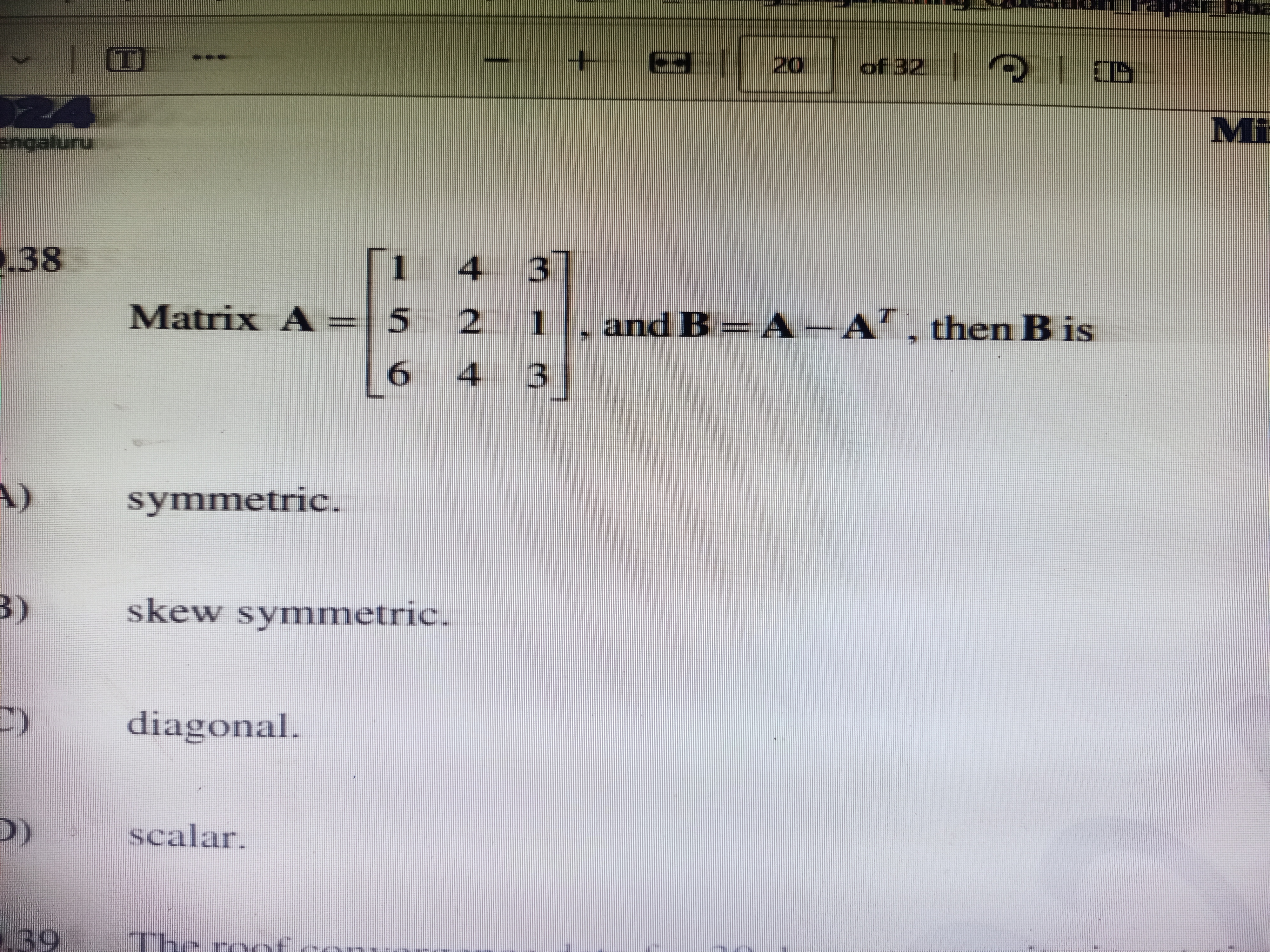Matrix A = [[1, 4, 3], [5, 2, 1], [6, 4, 3]], and B = A - A^T, then B is?

Understand the Problem
The question is asking us to find the nature of matrix B, which is derived from matrix A by subtracting its transpose. We need to analyze the resulting matrix to determine if it is symmetric, skew symmetric, diagonal, or scalar.
Answer
B is skew symmetric.
Answer for screen readers
Matrix B is skew symmetric.
Steps to Solve
- Calculate the Transpose of Matrix A
The transpose of matrix A, denoted as $A^T$, is obtained by flipping the matrix over its diagonal. For matrix
$$ A = \begin{bmatrix} 1 & 4 & 3 \ 5 & 2 & 1 \ 6 & 4 & 3 \end{bmatrix} $$
The transpose $A^T$ is
$$ A^T = \begin{bmatrix} 1 & 5 & 6 \ 4 & 2 & 4 \ 3 & 1 & 3 \end{bmatrix} $$.
- Subtract the Transpose from Matrix A
Now, we need to calculate matrix B by subtracting $A^T$ from A:
$$ B = A - A^T = \begin{bmatrix} 1 & 4 & 3 \ 5 & 2 & 1 \ 6 & 4 & 3 \end{bmatrix} - \begin{bmatrix} 1 & 5 & 6 \ 4 & 2 & 4 \ 3 & 1 & 3 \end{bmatrix} $$.
Performing the subtraction element-wise gives:
$$ B = \begin{bmatrix} 1 - 1 & 4 - 5 & 3 - 6 \ 5 - 4 & 2 - 2 & 1 - 4 \ 6 - 3 & 4 - 1 & 3 - 3 \end{bmatrix} = \begin{bmatrix} 0 & -1 & -3 \ 1 & 0 & -3 \ 3 & 3 & 0 \end{bmatrix} $$.
- Determine the Nature of Matrix B
To determine whether matrix B is symmetric, skew-symmetric, diagonal, or scalar, we examine the properties:
- A matrix is symmetric if $B = B^T$,
- A matrix is skew-symmetric if $B = -B^T$.
We calculate the transpose of B:
$$ B^T = \begin{bmatrix} 0 & 1 & 3 \ -1 & 0 & 3 \ -3 & -3 & 0 \end{bmatrix} $$.
Checking if $B = -B^T$, we see:
$$ -B^T = \begin{bmatrix} 0 & -1 & -3 \ 1 & 0 & -3 \ 3 & 3 & 0 \end{bmatrix} = B $$.
Thus, $B$ is skew-symmetric.
Matrix B is skew symmetric.
More Information
A skew-symmetric matrix has the property that its transpose is equal to its negative. This means all diagonal elements of a skew-symmetric matrix must be zero, which we can see in this case.
Tips
- Confusing skew-symmetric with symmetric matrices. Remember, for a matrix to be skew-symmetric, it must satisfy $B = -B^T$ and have all diagonal elements as zero.
- Miscalculating the transpose of the matrix. Always double-check element positions when transposing.
AI-generated content may contain errors. Please verify critical information